 Petzlover
Petzlover Biewer is originated from Germany but Grand Anglo-Francais Blanc et Orange is originated from France. Biewer may grow 48 cm / 18 inches shorter than Grand Anglo-Francais Blanc et Orange. Biewer may weigh 32 kg / 70 pounds lesser than Grand Anglo-Francais Blanc et Orange. Biewer may live 3 years more than Grand Anglo-Francais Blanc et Orange. Biewer may have less litter size than Grand Anglo-Francais Blanc et Orange. Biewer requires High Maintenance. But Grand Anglo-Francais Blanc et Orange requires Low Maintenance
Biewer is originated from Germany but Grand Anglo-Francais Blanc et Orange is originated from France. Biewer may grow 48 cm / 18 inches shorter than Grand Anglo-Francais Blanc et Orange. Biewer may weigh 32 kg / 70 pounds lesser than Grand Anglo-Francais Blanc et Orange. Biewer may live 3 years more than Grand Anglo-Francais Blanc et Orange. Biewer may have less litter size than Grand Anglo-Francais Blanc et Orange. Biewer requires High Maintenance. But Grand Anglo-Francais Blanc et Orange requires Low Maintenance
 The Biewer is, or was, a piebald Yorkie caused by a recessive gene in a breeding of two Yorkshire Terriers. On Jan 20, 1984 a piebald Yorkshire puppy was born in Hunsruck, Germany to Gertrud and Werner Biewer. The puppy was considered beautiful and the Biewer’s fell in love with it and began a process od selective breeding in an effort to breed piebald Yorkies. Based on a friend’s suggestion, they named this group of puppies, “Biewer Yorkshire Terrier a la Pom Pon”. By 1989 the Allgemeiner Club der Hundefreunde Deurschland (ACH) officially recognized the Biewer Yorkie as a separate breed. Today they are recognized world wide as two separate breeds.
The Biewer is, or was, a piebald Yorkie caused by a recessive gene in a breeding of two Yorkshire Terriers. On Jan 20, 1984 a piebald Yorkshire puppy was born in Hunsruck, Germany to Gertrud and Werner Biewer. The puppy was considered beautiful and the Biewer’s fell in love with it and began a process od selective breeding in an effort to breed piebald Yorkies. Based on a friend’s suggestion, they named this group of puppies, “Biewer Yorkshire Terrier a la Pom Pon”. By 1989 the Allgemeiner Club der Hundefreunde Deurschland (ACH) officially recognized the Biewer Yorkie as a separate breed. Today they are recognized world wide as two separate breeds.
Today there have been genetic studies done that have declared the Biewer Terrier to be a separate and distinct breed from the Yorkshire Terrier, not simply tricolored Yorkies. The BTCA (Biewer Terrier Club of America) changed the name and standard to an original one for the Biewer Terrier. Mrs. Biewer has accepted and signed this revised standard and it is the only one she has accepted. This new standard allows the Biewer Terrier to have a black coat and an undocked tail. In 2014 with the new standard the American Kennel Club Foundation Stock Service (ACK/FSS) accepted the Biewer Terrier. Some breeders still want the breed called the Biewer Yorkshire a la Pom Pon, but Mrs. Biewer has objected to this, insisting the dog is a terrier. The Biewer Breed Club of America (BBCA) insists on the breeding of Biewers only to other Biewers. This is opposed by others who are importing Biewers and breeding them with Yorkies. The result is not recognized as a purebred dog. BBCA breeders do not engage in this type of cross breeding or condone them. The BBCA breeds only dogs that meet the standard set by the BTCA.
The first two Biewers were imported to the States in 2003 by Donna Hall. They made history in 2003, when they were accepted by the IABCA (International All Breed Canine Association) and entered their first dog show. Today they are shown in rare breed dog shows around the world. Today there are two standards in operation for the Biewer as the American Biewer and the North American Kennel Club continue to follow the German standard while the BBCA follow the revised standard approved by Mrs. Biewer.
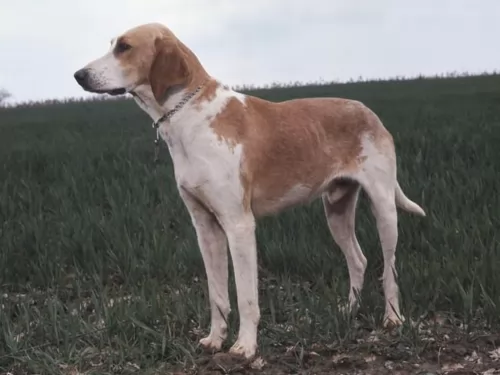 The Grand Anglo-Français Blanc et Orange is one of three Grand Anglo-Français breeds. The dogs comes from crossing French scenting hounds with English Foxhounds way back in the 19th century.
The Grand Anglo-Français Blanc et Orange is one of three Grand Anglo-Français breeds. The dogs comes from crossing French scenting hounds with English Foxhounds way back in the 19th century.
The sporting dog is rare, believing to be be pretty much confined to their country of origin – France. It is recognized in France by the French Kennel Club and also internationally by the Federation Cynologique Internationale. Since 2006, they have been recognized by the UKC and are thought to be kept essentially as a working dog as opposed to being kept as a companion dog.
 This long-haired terrier is a neat and compact toy dog. Their hair should be as long as their body is high and hang straight from the bottom of his skull to the end of his tail which is carried upward. He is a well proportioned and powerful little dog. He has no undercoat, but his overcoat is very much like human hair and should be combed. The head is a signature of the Biewer, covered with symmetrical gold, white and blue/black hair. They have flat, small heads and a black nose with an average muzzle. They have intelligent, dark, medium sized eyes and small ears shaped as a V and standing erect. All four legs are straight, and the hips are well formed. They have round feet and an undocked tail.
This long-haired terrier is a neat and compact toy dog. Their hair should be as long as their body is high and hang straight from the bottom of his skull to the end of his tail which is carried upward. He is a well proportioned and powerful little dog. He has no undercoat, but his overcoat is very much like human hair and should be combed. The head is a signature of the Biewer, covered with symmetrical gold, white and blue/black hair. They have flat, small heads and a black nose with an average muzzle. They have intelligent, dark, medium sized eyes and small ears shaped as a V and standing erect. All four legs are straight, and the hips are well formed. They have round feet and an undocked tail.
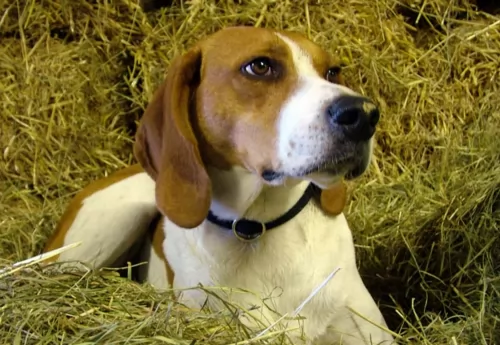 The lean, muscular Grand Anglo-Français Blanc et Orange is a large, powerful dog standing at 60 – 70cm at the withers and weighing 30 to 36 kg.
The lean, muscular Grand Anglo-Français Blanc et Orange is a large, powerful dog standing at 60 – 70cm at the withers and weighing 30 to 36 kg.
He has a short, broad head with a broad, flat skull. He has long legs, a long tail and long, floppy ears. His coat is white with orange markings. These dogs are instinctive hunters with a superb sense of smell and the ability to track their prey for miles.
Sociable, independent, loving and loyal, the Grand Anglo-Français Blanc et Orange can become attached to his owner. He doesn't want to be left alone for long periods of time, becoming bored and destructive.
Training and socialization is excellent for your dog, making him obedient and also more relaxed when you're not there.While he is patient and good with children, if you're looking for a playful pet, this dog wouldn't come as recommended for children, as his heart longs to just be outside on the hunt.
 The Biewer Terrier loves to be loved and he returns it in volumes. This is a dedicated, fun loving and charming little dog that you can carry around. They are loyal and friendly, athletic and alert. They are barkers when they need to be, but they are not “yappy dogs”. They love toys so make sure they have plenty. They will carry them wherever they go.
The Biewer Terrier loves to be loved and he returns it in volumes. This is a dedicated, fun loving and charming little dog that you can carry around. They are loyal and friendly, athletic and alert. They are barkers when they need to be, but they are not “yappy dogs”. They love toys so make sure they have plenty. They will carry them wherever they go.
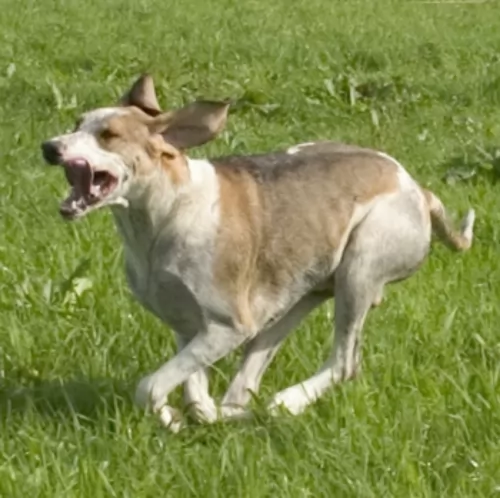 The Grand Anglo – Francais et Orange has always been a pack dog and used to being social. He will get on well with his entire human family as well as with any other pets in the home.
The Grand Anglo – Francais et Orange has always been a pack dog and used to being social. He will get on well with his entire human family as well as with any other pets in the home.
The Grand Anglo-Francais Blanc et Orange is a loyal dog, and when trained he becomes an excellent companion. He is patient with children, but doesn't make a particularly great playmate as he has a more serious personality.
The Grand Anglo-Francais Blanc et Orange is a dog that has been specifically developed to hunt, so ensure that he gets a good amount of exercise. While he is essentially a dog that loves working in a pack, he can still make his human family a loving and devoted pet.
 The Biewer Terrier is not a cross breed or hybrid and so does have some of the very serious health issues of the Yorkshire Terrier including the bane of small dogs with liver shunts. Liver shunts are fatal if they are not treated. The breed does have sensitive stomach issues as well. They face other small dog issues like floating patella’s, ear and skin infections. Other than this the Biewer Terrier is a very healthy breed.
The Biewer Terrier is not a cross breed or hybrid and so does have some of the very serious health issues of the Yorkshire Terrier including the bane of small dogs with liver shunts. Liver shunts are fatal if they are not treated. The breed does have sensitive stomach issues as well. They face other small dog issues like floating patella’s, ear and skin infections. Other than this the Biewer Terrier is a very healthy breed.
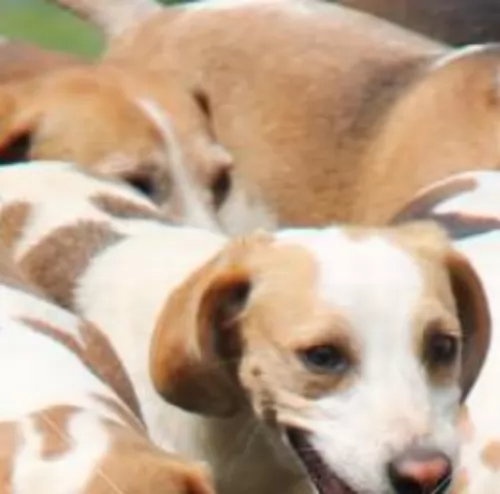 Capable of reaching 10 to 12 years in age, you won't really find any particular health issues with this dog. He is a fairly healthy dog and will be able to reach a good age with good nutrition, exercise, love and care.
Capable of reaching 10 to 12 years in age, you won't really find any particular health issues with this dog. He is a fairly healthy dog and will be able to reach a good age with good nutrition, exercise, love and care.
Because of the long, floppy ears, you want to be checking inside the ears. As a hunting scentdog, he will chase his prey through water if needs be, and damp ears can encourage bacteria.
Ear infections are common in most dogs, and you'll notice your pet scratching and rubbing at his ear and even shaking his head. You may also notice swelling or redness. Veterinary intervention will be necessary.
If your dog's ear infection has cleared up, you can maintain the health of the ear by cleaning them with a gentle cleanser and cotton wool. There is always caution when cleaning a dog’s ear, and rupturing the ear drum is one. Be careful, and if you're not sure, rather make an appointment with your vet to have his ears cleaned.
 As previously mentioned the Biewer Terrier has a very sensitive stomach and intestinal system. He should be fed low protein dry dog food. Watch for signs of food allergies such as scratching or chewing on his feet. Feed 2-3 times a day but the Biewer Terrier is one of the few dogs that you can safely free feed unless you notice substantial gaining of weight.
As previously mentioned the Biewer Terrier has a very sensitive stomach and intestinal system. He should be fed low protein dry dog food. Watch for signs of food allergies such as scratching or chewing on his feet. Feed 2-3 times a day but the Biewer Terrier is one of the few dogs that you can safely free feed unless you notice substantial gaining of weight.
Health issues are few as mentioned previously. However, make sure your Briewer’s ears are free of debris and wax, make sure their teeth are brushed and they show no signs of allergies. Along with liver shunts, sensitive intestinal and stomach issues and floating patellas, these are the other minor issues that might occur. Watch for diarrhea and off colored stools.
The Biewer Terrier is an active dog that needs regular exercise and walks. He is a speed demon as his ancestor the Yorkie is and needs an outlet for running as well as daily walks. They love to run, and they love to play. They do great in agility but love adventures. They are smart and love to learn tricks. Since they love hunting vermin they would also excel at Barn Hunt.
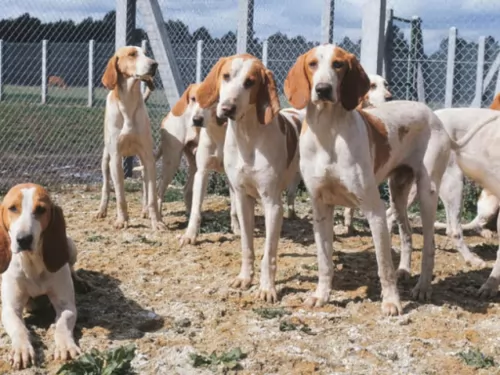 As a scenthound, your Grand Anglo-Français Blanc et Orange loves being outdoors and following a scent trail. These dogs therefore are better suited to life in the countryside as opposed to life in the city. Make sure you provide him with plenty of exercise – walks, swimming and running with you when you go cycling or jogging. Include ball- and rope games too.
As a scenthound, your Grand Anglo-Français Blanc et Orange loves being outdoors and following a scent trail. These dogs therefore are better suited to life in the countryside as opposed to life in the city. Make sure you provide him with plenty of exercise – walks, swimming and running with you when you go cycling or jogging. Include ball- and rope games too.
Your orange and white scent dog will thrive on you taking time out for him to brush his short coat twice a week and to also check for fleas and ticks at the same time.
Looking forward to his food, your energetic Grand Anglo-Français Blanc et Orange will require a high quality commercially manufactured food. Make sure that you buy the best brands to ensure your pet gets his vitamins and minerals in instead of just a lot of fillers, colorants and preservatives.
Many dog owners prefer giving their dogs several smaller meals throughout the day as opposed to one or two large meals. With his dry kibble you can add in some raw meat from time to time as well as cooked brown rice, cooked chicken and vegetables. See that he has access to a constant supply of fresh, cool water.